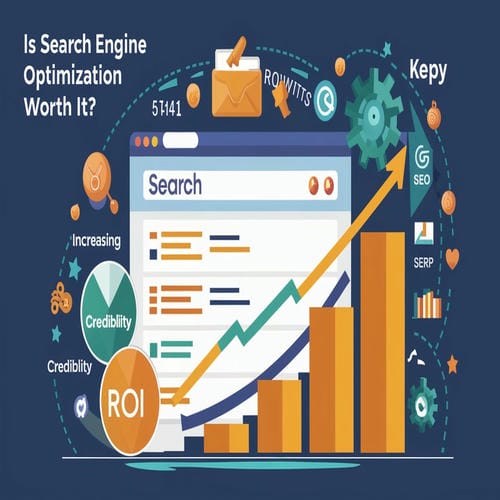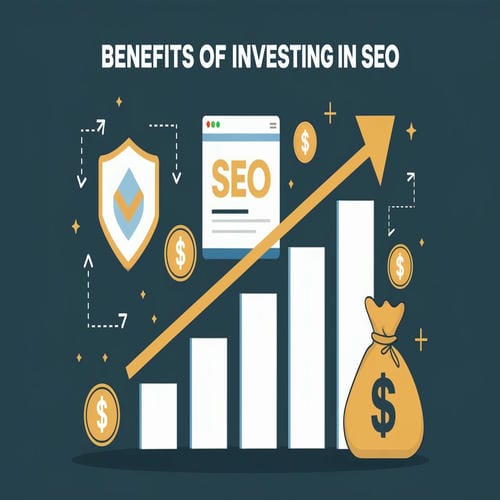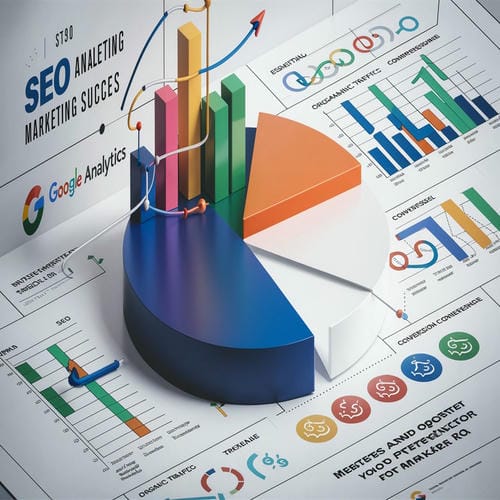Is search engine optimization worth it? If you’re running a business or managing an online presence, this question is likely top of mind.
In today’s digital age, where visibility can make or break a brand, mastering SEO is more crucial than ever. But is it worth the investment of time, effort, and possibly money? Absolutely. Beyond just boosting your website’s traffic, SEO enhances your credibility, builds trust with your audience, and delivers long-term, sustainable results.
In this article, we’ll dive deep into the pros and cons of SEO. We’ll explore how it can skyrocket your organic traffic, its cost-effectiveness compared to other marketing strategies, and the challenges you might face along the way.
By the end, you’ll have a clear understanding of whether SEO is the game-changer your business needs. So, let’s embark on this journey to unravel the true worth of search engine optimization.
Is Search Engine Optimization Worth it?
In today’s competitive digital landscape, achieving visibility on search engines is crucial for any business aiming to succeed online. Search Engine Optimization (SEO) serves as the cornerstone of digital marketing strategies, offering numerous tangible benefits that can propel your business forward.
1. Increased Organic Traffic
SEO focuses on optimizing your website to rank higher in search engine results pages (SERPs) for relevant keywords. When your site ranks higher, it naturally attracts more clicks and visits from users actively searching for products or services like yours.
Studies consistently show that websites appearing on the first page of search results receive the majority of clicks, highlighting the importance of SEO in driving organic traffic.
2. Enhanced Brand Visibility and Credibility
Securing a top position in search results not only increases traffic but also boosts your brand’s credibility. Users tend to trust websites that appear prominently in search results, often viewing them as authoritative sources within their industry.
Effective SEO strategies, such as optimizing content with relevant keywords and earning high-quality backlinks, can significantly enhance your brand’s visibility and reputation online.
3. Long-Term Cost-Effectiveness
Compared to other digital marketing tactics like pay-per-click (PPC) advertising, SEO offers a cost-effective approach to attracting organic traffic. While SEO requires an upfront investment in time and resources to implement strategies such as keyword research, content optimization, and technical SEO improvements, the long-term benefits can outweigh the initial costs.
Unlike PPC, where traffic stops as soon as you stop paying for ads, SEO efforts can continue to drive organic traffic and results over time with ongoing maintenance and updates.
Understanding the benefits of SEO goes beyond mere traffic numbers—it’s about establishing a strong online presence, enhancing credibility, and achieving sustainable growth for your business.
Must Read:
- How to Learn Search Engine Optimization?
- How to Earn Money by Search Engine Optimization?
- How to Become a Search Engine Optimization Specialist?

The Benefits of Investing in SEO
Investing in Search Engine Optimization (SEO) offers substantial advantages for businesses aiming to enhance their online presence and drive sustainable growth.
1. Increased Organic Traffic
SEO focuses on optimizing your website to rank higher in search engine results pages (SERPs) for relevant keywords. By appearing prominently in search results, you attract more clicks and visits from users actively searching for products or services like yours, resulting in increased organic traffic.
2. Enhanced Brand Visibility and Authority
Securing top positions in search results not only boosts traffic but also enhances your brand’s credibility and authority. Users tend to trust websites that appear higher in search rankings, positioning your brand as an industry leader and driving brand awareness.
3. Cost-Effectiveness
Compared to other digital marketing strategies like pay-per-click (PPC) advertising, SEO offers a cost-effective approach to attracting organic traffic. Once you achieve high rankings, the ongoing maintenance and optimization costs are relatively low, making SEO a sustainable investment over time.
4. Long-Term Results
Unlike PPC campaigns that stop generating traffic once you pause or stop funding them, SEO efforts can continue to drive organic traffic and results for an extended period. With consistent optimization and updates, you can maintain and even improve your rankings, ensuring long-term visibility and growth.
5. Targeted Traffic and Higher Conversion Rates
SEO helps attract highly targeted traffic from users actively searching for specific products or services. This targeted traffic often leads to higher conversion rates since visitors are more likely to engage with your content, products, or services, resulting in increased sales and revenue.
Investing in SEO is not just about improving search rankings; it’s about enhancing brand visibility, driving targeted traffic, and achieving sustainable business growth. Understanding these benefits will empower businesses to make informed decisions about integrating SEO into their digital marketing strategies for long-term success.
Related Articles:
- How Does Search Engine Optimization Work?
- How to use Search Engine Optimization?
- How to Optimize a WordPress site for Search Engines?

Challenges and Considerations
Achieving success with SEO involves more than implementing strategies. It requires navigating through various challenges and considerations that can impact your efforts.
1. Time-Intensive Nature
SEO is a long-term strategy that requires patience and consistent effort. Unlike some forms of digital marketing that can yield immediate results, SEO often takes time to show significant improvements in rankings and traffic. It involves tasks such as keyword research, content creation, technical optimizations, and link building, all of which require ongoing attention and refinement.
2. Algorithm Changes and Updates
Search engines frequently update their algorithms to deliver more relevant and valuable results to users. These updates can impact your website’s rankings, sometimes necessitating adjustments to your SEO strategies. Staying informed about algorithm changes and adapting your approach accordingly is crucial to maintaining and improving your search engine visibility.
3. Competitive Landscape
In many industries, competition for top rankings in search results is fierce. Competitors are constantly optimizing their websites and content, making it challenging to achieve and maintain high rankings.
To stay ahead, businesses must continuously monitor competitor strategies, identify opportunities for improvement, and innovate their SEO tactics to differentiate themselves.
4. Technical Complexity
SEO involves technical aspects such as website structure, page speed optimization, mobile responsiveness, and schema markup implementation. Ensuring your website meets technical SEO best practices requires expertise and attention to detail.
Technical issues, such as broken links or duplicate content, can negatively impact your SEO performance if not addressed promptly.
While SEO offers numerous benefits, it’s essential to acknowledge the challenges and complexities associated with implementing an effective strategy. Understanding these challenges will help businesses make informed decisions about investing in SEO for long-term growth and success.
Trending Articles:

Measuring ROI and Effectiveness
Understanding the return on investment (ROI) and effectiveness of SEO is crucial for evaluating its impact on your business’s bottom line and overall marketing strategy.
1. Key Performance Indicators (KPIs)
Measuring the success of SEO efforts involves tracking key performance indicators (KPIs) such as organic traffic, keyword rankings, conversion rates, and revenue generated from organic search. These metrics provide insights into how well your SEO strategies are driving results and contributing to your business objectives.
2. Comparative Analysis with Other Marketing Channels
Comparing the ROI of SEO with other digital marketing channels, such as pay-per-click (PPC) advertising or social media marketing, helps assess its cost-effectiveness. Unlike PPC, where costs accrue with each click, SEO can deliver ongoing organic traffic without additional expenses, making it a valuable long-term investment.
3. Attribution Models
Understanding how SEO contributes to conversions and sales requires implementing attribution models that track customer journeys across multiple touchpoints. Tools like Google Analytics offer attribution reports that help attribute conversions to specific channels, including organic search, providing insights into the impact of SEO on your business’s revenue.
4. Tools and Analytics
Utilizing SEO tools and analytics platforms is essential for monitoring performance, identifying opportunities for improvement, and making data-driven decisions. Tools such as SEMrush, Ahrefs, and Moz provide insights into keyword rankings, backlink profiles, and technical SEO issues, empowering businesses to optimize their SEO strategies effectively.
Measuring the ROI and effectiveness of SEO goes beyond traffic numbers—it’s about understanding how SEO contributes to your business’s goals and objectives.
By understanding the metrics and analytics associated with SEO, businesses can make informed decisions about allocating resources and maximizing their digital marketing efforts.

Calculating the Value of SEO
Understanding the observable value of Search Engine Optimization (SEO) involves assessing its impact on key business metrics and overall marketing performance.
1. Return on Investment (ROI)
Measuring the ROI of SEO entails evaluating the revenue generated from organic search compared to the investment in SEO efforts. This can include costs associated with SEO activities such as content creation, link building, technical optimizations, and SEO tools.
Tracking conversions attributed to organic search and comparing them against SEO expenses provides insights into the profitability of SEO campaigns.
2. Cost per Acquisition (CPA)
Determining the cost per acquisition through SEO involves dividing the total SEO expenditure by the number of conversions generated from organic searches. This metric helps gauge the efficiency and affordability of acquiring customers through SEO compared to other marketing channels.
3. Lifetime Value (LTV)
Calculating the lifetime value of customers acquired through SEO considers the revenue generated from a customer over their entire relationship with the business. SEO-driven customers may exhibit higher LTVs due to their organic discovery and potentially lower acquisition costs.
4. Attribution Models
Implementing attribution models helps attribute conversions and sales to specific SEO efforts, such as keyword optimizations, content improvements, or technical SEO enhancements. Understanding which SEO tactics contribute most effectively to conversions allows businesses to optimize their strategies accordingly.
By quantifying the value of SEO through ROI, CPA, LTV, and attribution modelling, businesses can make informed decisions about allocating resources to SEO initiatives. Understanding these calculations is essential for leveraging SEO as a strategic asset in digital marketing efforts.

SEO vs. Traditional Marketing
In the realm of digital marketing, Search Engine Optimization (SEO) and traditional marketing represent distinct approaches with unique advantages and considerations.
1. Reach and Targeting
Traditional marketing, encompassing methods like television, radio, and print advertising, offers broad reach but lacks precise targeting capabilities. In contrast, SEO enables businesses to reach audiences actively searching for specific products or services, ensuring highly targeted exposure.
2. Cost-Effectiveness
SEO often proves more cost-effective than traditional marketing channels like TV ads or billboards. While traditional marketing requires substantial upfront investment with ongoing costs for placements, SEO involves initial setup and optimization expenses, followed by lower maintenance costs over time.
3. Measurability and ROI
One significant advantage of SEO lies in its measurability. Tools like Google Analytics provide detailed insights into traffic sources, keyword performance, and conversion rates, allowing businesses to track ROI effectively. Traditional marketing, on the other hand, poses challenges in measuring precise ROI due to limited tracking capabilities.
4. Durability of Results
SEO efforts can yield long-term results through sustained visibility in search engine results, driving ongoing organic traffic and engagement. In contrast, traditional marketing campaigns often have finite durations, with visibility and impact ceasing once the campaign ends.
While traditional marketing strategies offer broad reach and brand awareness, SEO excels in targeted audience engagement, cost-effectiveness, measurability, and long-term sustainability. Combining both approaches strategically can enhance overall marketing effectiveness, utilizing the strengths of each to achieve comprehensive marketing goals in today’s competitive landscape.
Conclusion
Choosing whether to invest in SEO or traditional marketing depends on your business goals and audience reach. While traditional marketing offers broad exposure, SEO excels in targeted engagement and long-term ROI.
To maximize your online presence and attract quality traffic, incorporating SEO into your digital strategy is paramount. Take the next step towards enhancing your digital presence today.
Ready to optimize your website for success? Visit Devtrain.co for expert SEO services tailored to elevate your online visibility and drive sustainable growth.


